Out There: January 2008 Archives

Another cheap treat gone.
Relatively cheap, relatively gone.
You probably have read that you shouldn't eat top-of-the-line bluefin sushi and sashimi anymore. Too much mercury. (Yellowfin and albacore are still OK.) Maybe a single, heart-red piece on Valentine's Day.
Love, even sushi love, always courts death.
New York Times target readers, whose grandparents carried smelts and flukes wrapped in all the news that had been fit to print, are now seriously peeved at their lifestyle read, blaming the messenger for the mercury. (Yes, there's a Roman pun there.) That's not altogether nutty, because the Times requested the "how much mercury?" study; the paper again made its own news.
In this country, sushi and sashimi have slowly moved from being the butt of Borscht Belt jokes, to urbane bonbons, to fifth-grade lunchbox fare. And now? The overfished sources of sushi's luscious signature flesh must serve their other purpose: living thermometers for oceanic warming. Poor tuna fishes, doomed one way or the other.
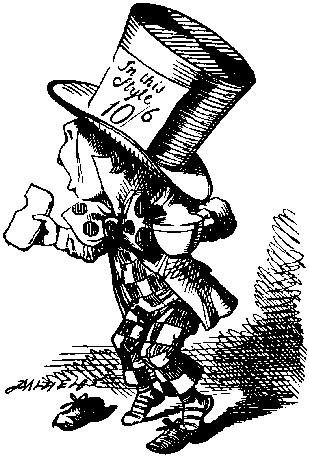
Do not doubt that the "mad as a hatter" symptoms of mercury poisoning are serious, especially for children. Plus, the debilitating condition is difficult to diagnose. I've been told the malady is occasionally reversible, but I'd hardly interpret that as permission to binge and recoup.
So, knowing a little something about the newspaper business (as well as how health standards are set by the unimpeachable Environmental Protection Agency), my new bluefin recipe mixes caution with a pinch of doubt. I did choose wild salmon over tuna just now at the fishmonger, but that's because...
Fish Stories
Do you remember your first piece of raw fish? No kidding, I'd like to know; the time in which all our foundations and pie crusts are crumbling is an interactive age. Me, I don't recall the brave event. (When was John Kennedy shot? That's easy.) My tuna memories are overheated family ones, like the time...
My father and younger brother liked to fish. They bonded over it and one summer morning drove before sunrise on the Sunrise Highway from home in Howard Beach, Queens, to Montauk Point on New York's Long Island, to go out on the tuna boats. Late that afternoon...
I saw them next door, by the upright freezer in a neighbor's garage. They were uncharacteristically scruffy, trying to shove thick, dripping, paper-wrapped blocks of something into an already occupied space.
My Kiev-born dad, usually agreeable to the point of being not quite there, was really annoyed. "She doesn't want this beautiful fish we just caught in her kitchen. I'm gonna hafta give it away."
My Bordeaux-born mom couldn't countenance cooking anything that had obviously grown in dirt, breathed fresh air, or swam unhampered in the sea. Only canned. Frozen. In a pinch, polished and chilled.
Those many pounds of throbbing, pristine bluefin (what he said it was) that weren't good enough for Mrs. Weinstein's stove might now be worth, say, $100,000. That catch was in the 1960s. No one I knew or could possibly have known had ever tasted tuna, even in a Greenwich Village "Salade Nicoise" with canned black olives, that hadn't been wrecked by factories and buried in tin. What in the world does the original look like? How would you prepare it? The freezer door was leaned upon by two or three grown men until it shut.
I adore canned tuna because it reminds me of my yoot, and I can make you on short notice a very nice tuna salad.
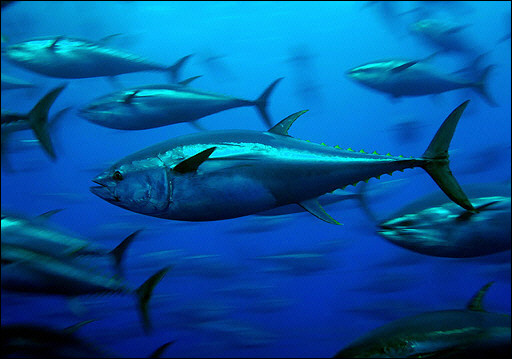
Tuna Tale Two
This sounds crazy. Anyone who knows me can see that when I was in my twenties, I wasn't a whit bigger or stronger than now. Maybe slightly more bouncy, the way unused youngsters are, and certainly leaner, with dark, Breck-worthy hippie-hair.
So why was I a signature away from becoming "cookie" on a San Diego tuna boat? Three months, out on the very high seas, with a whole bunch (the proper word is crew) of capital-M men, preparing all their brekkies, lunches and dinners, when my latest mass-feed triumph was 200 stuffed mushrooms, a dozen roasted ducks, and a case of the most profound 1974 Sonoma zin my catering budget would allow?
Details escape me, but simple fear vanquished my lust for income and adventure. And I had never cooked raw tuna before, just the usual gourmet girlie casseroles. I had no idea how to filet -- or even to lift -- such a thing.
What was that fleet manager thinking? He must have really liked my duck.
But in my week of indecision, I read everything there was to know about tuna fishing: the suicidal solitude, the boozing, the drenching cold, the miniature Moby Dick-ness -- and the risk that, if the catch were paltry, you would never see the small fortune you had been promised.

And Just in Case It Slipped By
I also read that two colas a day, regular or diet, increase the chance of kidney failure. It's the phosphates. So let me tell you about my early, fateful introduction to Patio Diet Cola, "refreshing way to stay thin"...
* * *
For an automatic alert when there is a new Out There post, email jiweinste@aol.com.

Remember my forgotten man
You put a rifle in his hand
You sent him far away
You shouted, "Hip, hooray!"
But look at him today.
Nothing, I repeat, nothing in the cowardly realm of popular culture makes me weep the way the sinfully uncelebrated Joan Blondell does when she sings these lyrics in the final set-piece of Busby Berkeley's Gold Diggers of 1933.
I happened to catch the genius Berkeley's Footlight Parade on Turner Classic Movies, and its irrepressible Depression bounce (how the boys and girls of the chorus drop everything and dash when crates of food arrive) led me to the library and its trove of Busby DVDs. I put on the first of his Gold Diggers ... and was a goner.
That old movie, the kind anyone then would buy a ticket to see, actually found the face of government heartlessness toward the country's broke and rejected World War vets, and spat on it. And not with Jon Stewart manipulation or HBO cynicism. With a voice, an expressive, passionate musical voice.
Audiences loved the art and the nerve of it -- and still would.
Al Dubin wrote the bread-line words and Harry Warren the minor-key music of "Remember My Forgotten Man." Tell me, do Out There readers know how riveting entertainment can be when it is knit into some kind of unforeseen, imaginative truth? All my life I have loved movies and TV because they told me how to grab the most important ideas and feelings from the gutter. "Million Dollar Movie," the TCM of its time, was my premier childhood classroom. But now, popular films in particular are flying fast from any connection to honesty or risk.
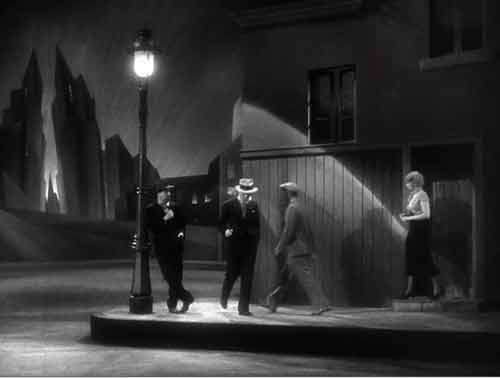
Scene from the "My Forgotten Man" number in Gold Diggers of 1933. Joan, at right, plays a "working girl."
I grew up not with parents, but in front of a screen. I haven't bought a ticket to see a movie in almost a year. Vivacious Joan, who could act Saturn rings around the likes of phony Crawford and unintentionally best her predictable partner Cagney, had that "thing" that enabled her to stride the gulf between role and real. Those vintage images and crackling sounds she made have more blood and guts in them than any nightly Fox newscast. Where is the voice that will nail war now?
If you need any argument for the import of the cultural arts, she is it.
* * *
Click here for the "My Forgotten Man" number. The astounding second singer of the song is an uncredited Etta Moten, who's also the "Brazilian" who warbles "The Carioca" in Flying Down to Rio as a newly coupled Fred and Ginger burn up the floor.
Later a radio journalist, Moten was the first African American to sing at the White House when, in 1934, Eleanor Roosevelt invited her to reprise "My Forgotten Man" for FDR's birthday. Moten played Bess in the 1942 revival of Porgy and Bess at the request of George Gershwin, who reportedly wrote the role with her in mind.
She refused to sing the word nigger, which brother Ira later removed from the libretto.
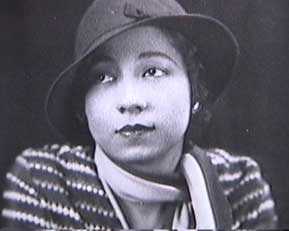
* * *
For an automatic alert when there is a new Out There post, email jiweinste@aol.com.
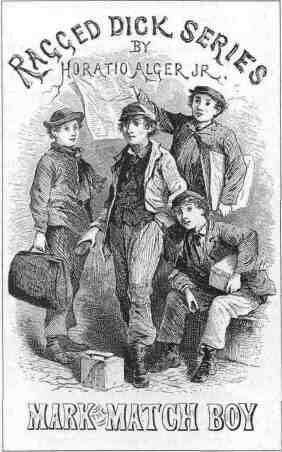
When Idols Fall
For those generous souls who were taken aback by the assertion in the last Out There posting that author Horatio Alger, Jr. was a pederast, you may wish to read this careful explanation of why the young Unitarian minister left his Brewster, Mass. parish so hastily.
And on a More Cheerful Note...
Have you heard about the fascinating blind study that demonstrates that drinkers prefer wine they think costs a lot more to the exact same vino at a giveaway price? ("Scientists prove that paint dries slowly.")
Brain scans show that it's not just a silly whim: neural "pleasure centers" actually go rat-tat-tat when the drinkers think they're getting something that's top-of-the-line. Yet maybe the response has more to do with the distinct thrill, one that every bargain-hunter knows, of getting something for nothing. The more expensive the freebie, the more you've ripped the system off.
The next step? Apply the logic of this discovery to museum and performance admissions. For example, MoMA should raise its $20 ticket price to $100, but collect from only one out of five and let the other four visitors walk in, gratis. Total proceeds would remain the same.
"It must be the best art in the world," they all will say. And the ones who didn't pay a dime will enjoy themselves even more.

* * *
For an automatic alert when there is a new Out There post, email jiweinste@aol.com.
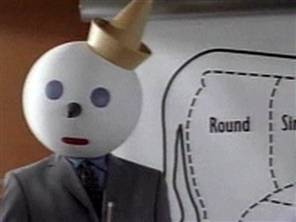
It is a rule universally acknowledged that when knocking out traditional newspaper obituaries, or even those obit hybrids called "appreciations," the dutiful scribe should do everything possible to avoid speaking ill of the dead. ("No one brought more pride to a disheartened nation in so short a time as did Mr. Hitler.")
So, Out There is happy to note that its writer is under no such fusty obligation when drawing attention to the passing of Carl Nicholas Karcher, 90, founder and chairman emeritus of the Carl's Jr. restaurant chain. Mr. Karcher died Jan. 11 in Fullerton, Calif., and although he has been referred to as a "giant" of the fast-food industry, his particular accomplishments made life worse, not better, for those who eat out and those who come out.
Strange that two of the most gay-negative American figures of the 1970s would be connected to food: Karcher and Anita Bryant, the orange-juice flack whose robotically vicious "Save Our Children" campaign against gay rights empowered both gay-haters and their opposites.
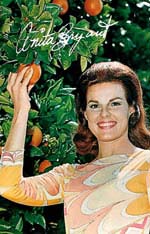
The initial, misery-making success of Bryant's efforts personally backfired, causing the saccharine singer to lose not only her big-bucks position with the Florida Citrus Commission -- a national o-jay boycott had its consequences -- but also her husband at the time, her manifold businesses, and her Little Miss Sunshine fame. She became despised, a national figure of fun.
Bryant succeeded, however, in normalizing the "no special rights" and "they recruit our children" arguments that continue to belch up in those sad and sobering online-comment threads. You still can't adopt children in Florida, and many other states, if you're queer.
I have read that the miscreant later apologized for her potentially self-serving bigotry, but any record of that crow meal remains, shall we say, fugitive: the "apology" heard 'round the block.

No one has published Ms. Bryant's obit yet, though I bet a few, careful 800-word pieces are sitting in the computer files of well-run traditional papers and wires, ready and waiting.
Sins of the Fresh
Mr. Karcher committed two mortal sins, and Out There leaves it to faithful readers to measure their relative badness. The first? According to Nation's Restaurant News, a remarkably on-the-ball trade rag, Karcher invented -- or at least first instituted, in a balance-sheet manner -- char-broiled chicken-breast sandwiches, self-service beverage stations, and, maxima culpa, the salad bar.
During the time giant reptiles and scaly raptors ruled the Earth, I wrote a column about why salad bars would be the death of salads. I am sure that present readers, whose Favorites Lists are pregnant with culinary blogs of every kind, will be able to recite as their birthright my now wearisome points. I must admit that at my last job, deep in Manhattan's midtown, I occasionally opted for the salad bar's scion, the "point and shake" plastic-bowl assemblies of greens, proteins, and salty bits, knit by a flavored mucilage called dressing.
Salad bar pluses? Ingredients a 7-year-old may never have seen. A lesson in do-it-yourself. A microcosm of community, a five-minute food co-op without dues or obligation.
Negatives? Gee whiz...how about "germ farm." A substitution of promise for satisfaction, of choice for achievement. The permanent exile of seasonal pleasure.
Bad Mr. Karcher! (Rich Mr. Karcher.)
Briggs Goes Down
His plentiful lettuce, dear readers, funded something called the Briggs Initiative, or Proposition 6, on the California ballot in 1978. John V. Briggs was a queer-hating state assemblyman and senator from Orange County who wanted to keep gay men and lesbians from teaching in public schools because they were, every single one, "immoral." He got his half-million signatures, and Carl Sr. threw his hamburger buns completely behind the strident effort.
According to the Advocate, Joan Baez, Harry Chapin, Holly Near, and Peter Yarrow raised $25,000 (not so bad then) at a sold-out benefit concert in Santa Monica to fight the proposal -- already law in Arkansas and Oklahoma (which is where Anita Bryant withdrew). And then, former California governor Ronald Reagan, ready to run for president, quietly let it be known he was against the proposition, saying that as far as he knew, homosexuality wasn't infectious "like the measles." Briggs went down.
In 1989 (according to Bloomberg News), Carl Karcher agreed to pay a $664,000 fine to the Securities and Exchange Commission to settle charges of insider trading, with no admission of guilt attached.
A Horatio Alger Story
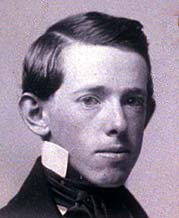
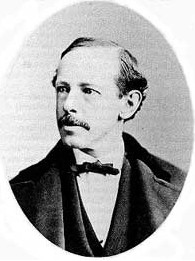
Left, Horatio Alger, Jr. at Harvard in 1853; right, the wildly successful author of Ragged Dick
You want something nice? In 1979, the businessman received the Horatio Alger Award, a solid recognition of Karcher's bootstrapiness. It is very likely that no one at the teary ceremony mentioned the easily demonstrated queer, and criminal, subtext of Horatio Alger, Jr.'s novels, or, if you scour the records, that the real-life author was attracted to an assortment of Carl Jrs.: the frisky Cape Cod reverend was a pederast, a lover of boys. Of course, after Alger escaped to New York and became wealthy, he tried his best to make things better for male orphans and runaways.
Belated congratulations, and farewell, Mr. Karcher.
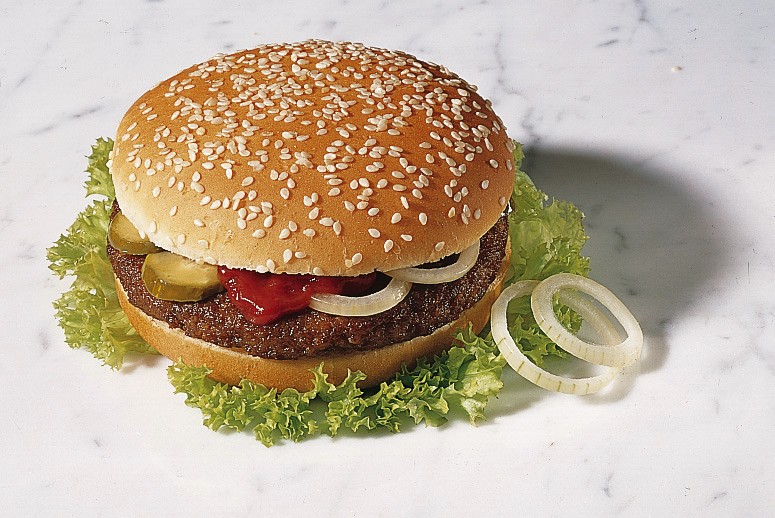
* * *
In answer to the last post's question, its poetic title "Handful of Clouds" comes initially not from dialog in Jimmy Cagney's first film (as I had thought), but, according to S.F. Weekly's irresistible restaurant critic and cineaste Meredith Brody, from a 1930 film "based on the Rowland Brown short story 'A Handful of Clouds' that I think introduced the concept or metaphor to Hollywood (it's called The Doorway to Hell but A Handful of Clouds in England)." The Gay Recluse got it as well (see comment on previous post).
I grabbed the phrase from the also-1930 Sinner's Holiday, in which the clattering Cagney character uses it as softener for death: "You don't think I'm the guy who handed Mitch that handful of clouds, do ya?" (He shot Mitch.)
Who Do You Trust? was a 1960s afternoon-TV quiz show starring Johnny Carson, whose title gave high-school English teachers prissy ammunition and whose popularity shot the once-hayseed host onto nighttime NBC.
* * *
For an automatic alert when there is a new Out There post, email jiweinste@aol.com.
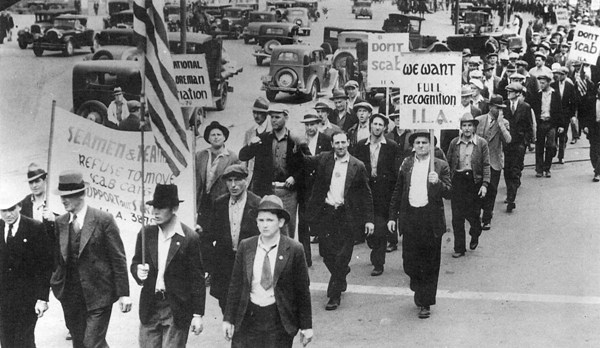
Don't scab! A 1934 San Francisco picket line.
Who (or Whom) Do You Trust?
Have you ever crossed a picket line?
That uncommon test of one's character -- uncommon because there are fewer unions and fewer union actions -- is more likely to be faced vicariously and safely on the Sally Field platforms of narrative culture. But you probably know why I'm asking, because on the new year's first Wednesday night, a certain "populist" presidential candidate crossed the line, as it were, in Burbank, Calif., to appear with fellow gay-baiter Jay Leno. (The Huckabee thread on the Writers Guild of America website is heartening.)
So I bravely decided that I wouldn't cross this virtual picket line and chose to watch David Letterman instead, hoping that the items on his Top Ten List would be union demands. And they were, each read by a striking member of the Writers Guild:
"Complimentary tote bag with next insulting contract offer" -- The Daily Show's Tim Carvell
"I'm no accountant, but instead of us getting 4 cents for a $20 dollar DVD, how about we get $20 for a 4-cent DVD?" -- Law & Order's Gina Johnfrido
"Hazard pay for breaking up fights on The View" -- Nora Ephron
Progressive owner Dave settled a better-than-decent contract with his shop, so he had a new written show. Leno wrote his own, and there's still some guild discussion as to whether that makes him a scab.
"Scab" is a noun and a verb.
Letterman's Jan. 2 show, the first in months that wasn't a rerun, began with a line of high-stepping chorines holding Writers Guild signs. "How 'bout those Eugene V. Debs?" Dave quips, demonstrating why his program will never be the talk-show front-runner, appealing as it does to a slightly skewed demographic.
Debs's V, by the way, stands for Victor, an optimistic touch.
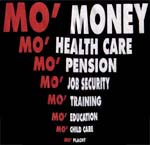

Village Voice union T-shirt, early '90s, front and back
Saving Our Voice
Speaking of V, the Village Voice, where I worked for almost two decades, was unionized, but not with the usual newsprint union, the Newspaper Guild. That cement-bound group was suspicious of the weekly paper's use of regular freelance writers and wouldn't be bothered to find a way to cover them. Sad to say, the Newspaper Guild does poorly with those sort of real-life issues even now.
District 65, a smaller but much more creative organization, bargained these writers in and helped us to negotiate contract after contract with Voice owners such as Rupert Murdoch. District 65 later merged with the United Auto Workers, which gave us pink-collar types an iconic -- yet ironic -- assembly-line oomph during our CBGB-ish fundraisers.
Unions and the arts, together again.
* * *
Can anyone recognize where the title of this posting comes from? Or -- easier -- the first subhed?
For an automatic alert when there is a new Out There post, email jiweinste@aol.com.
